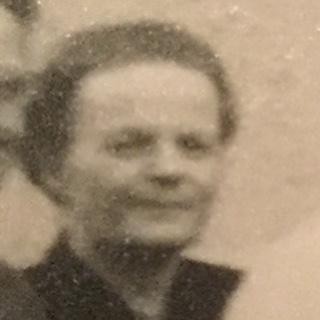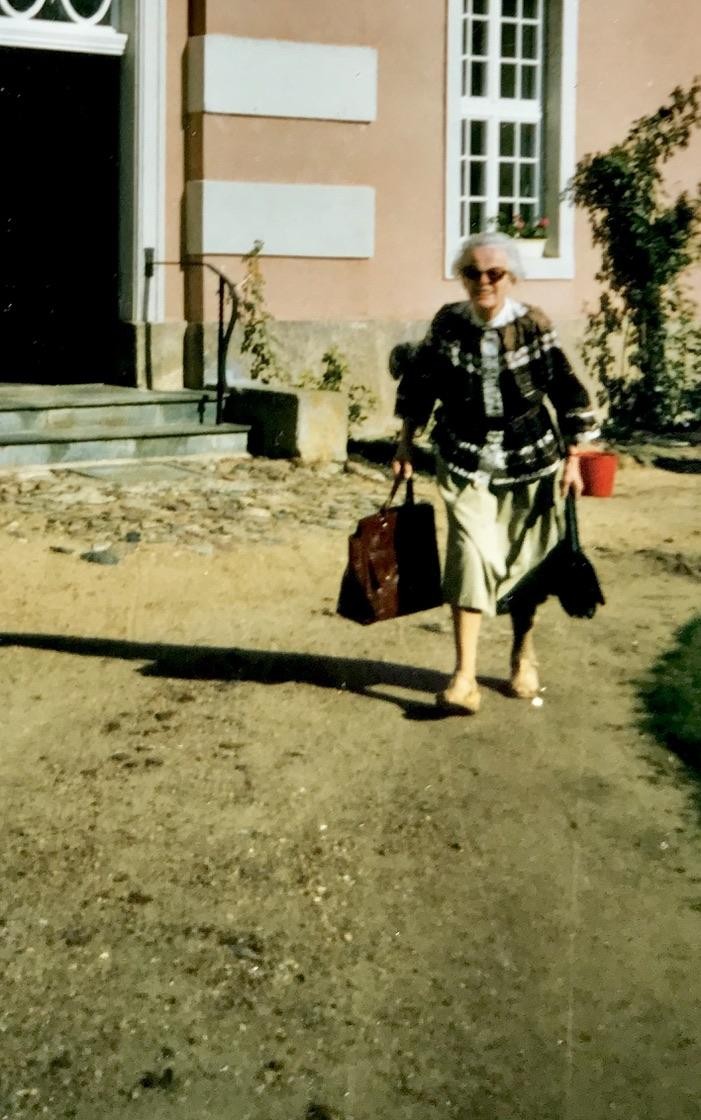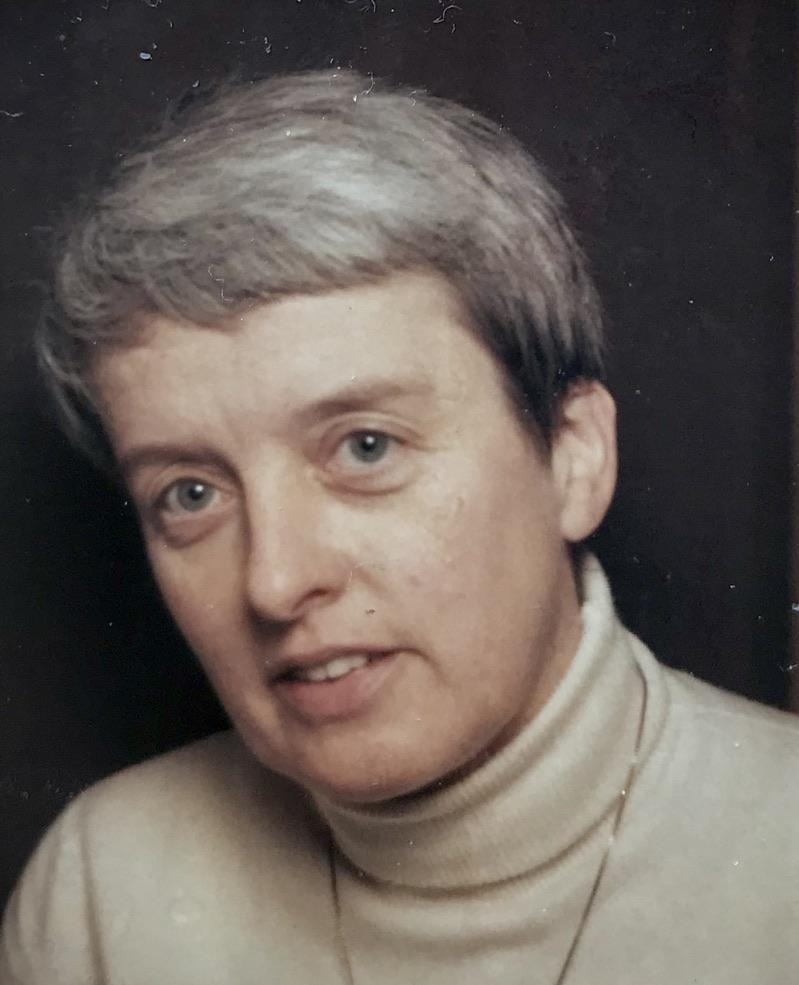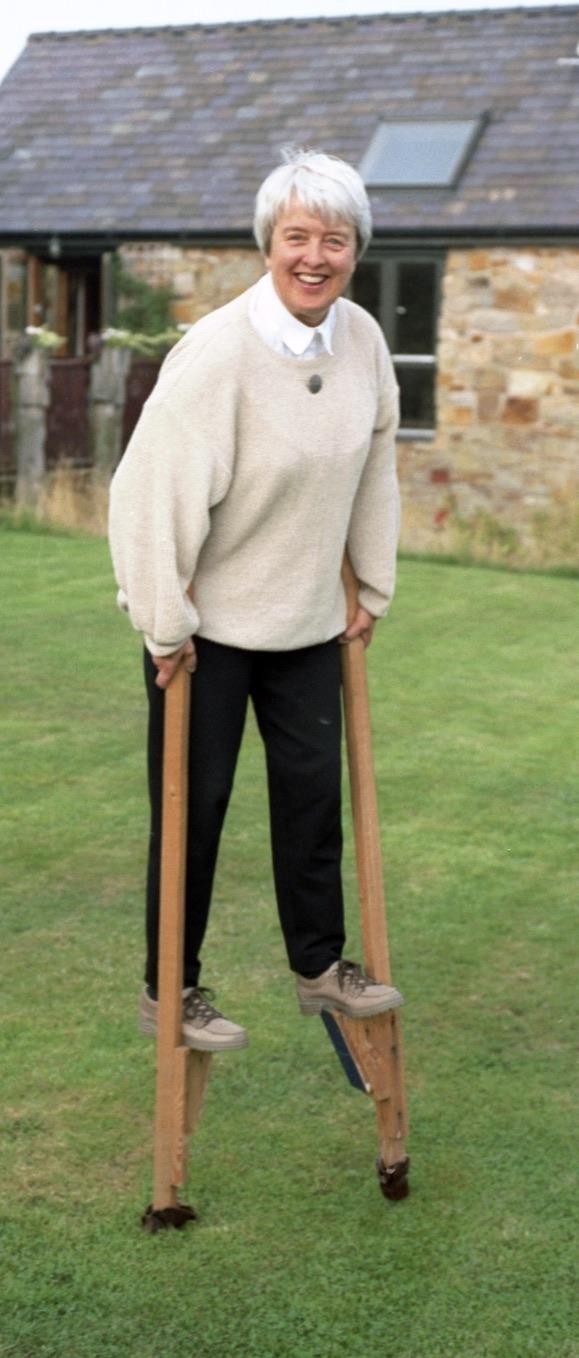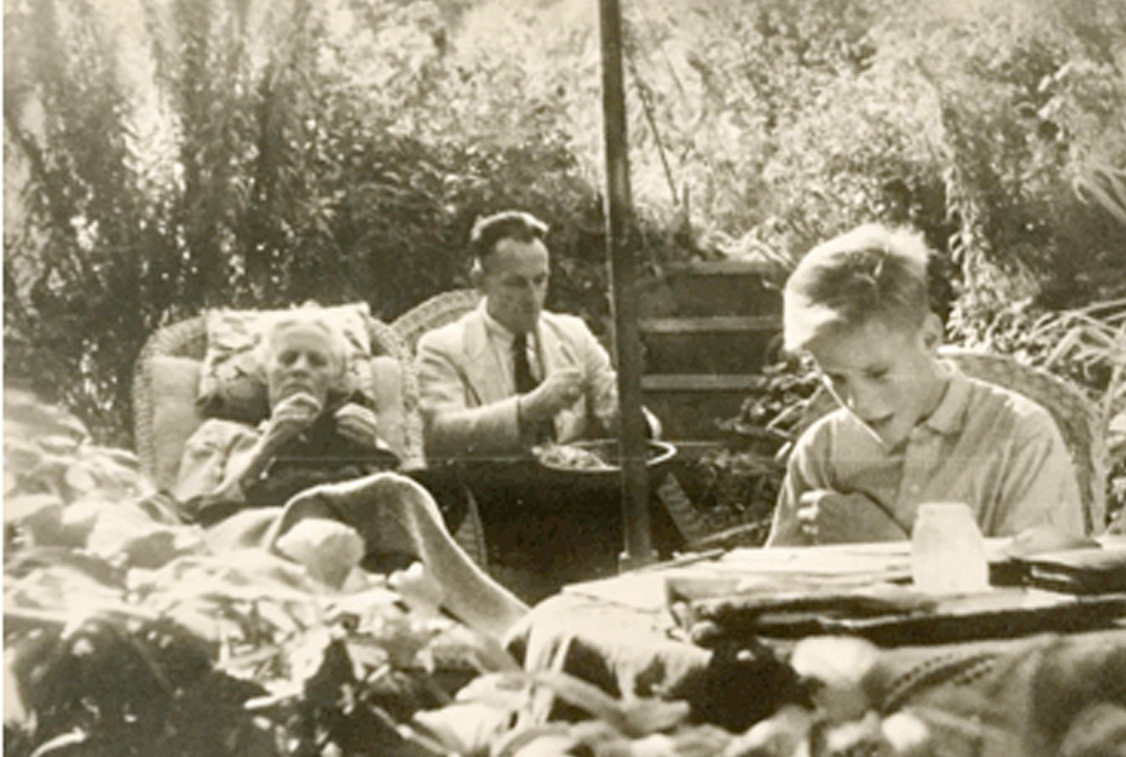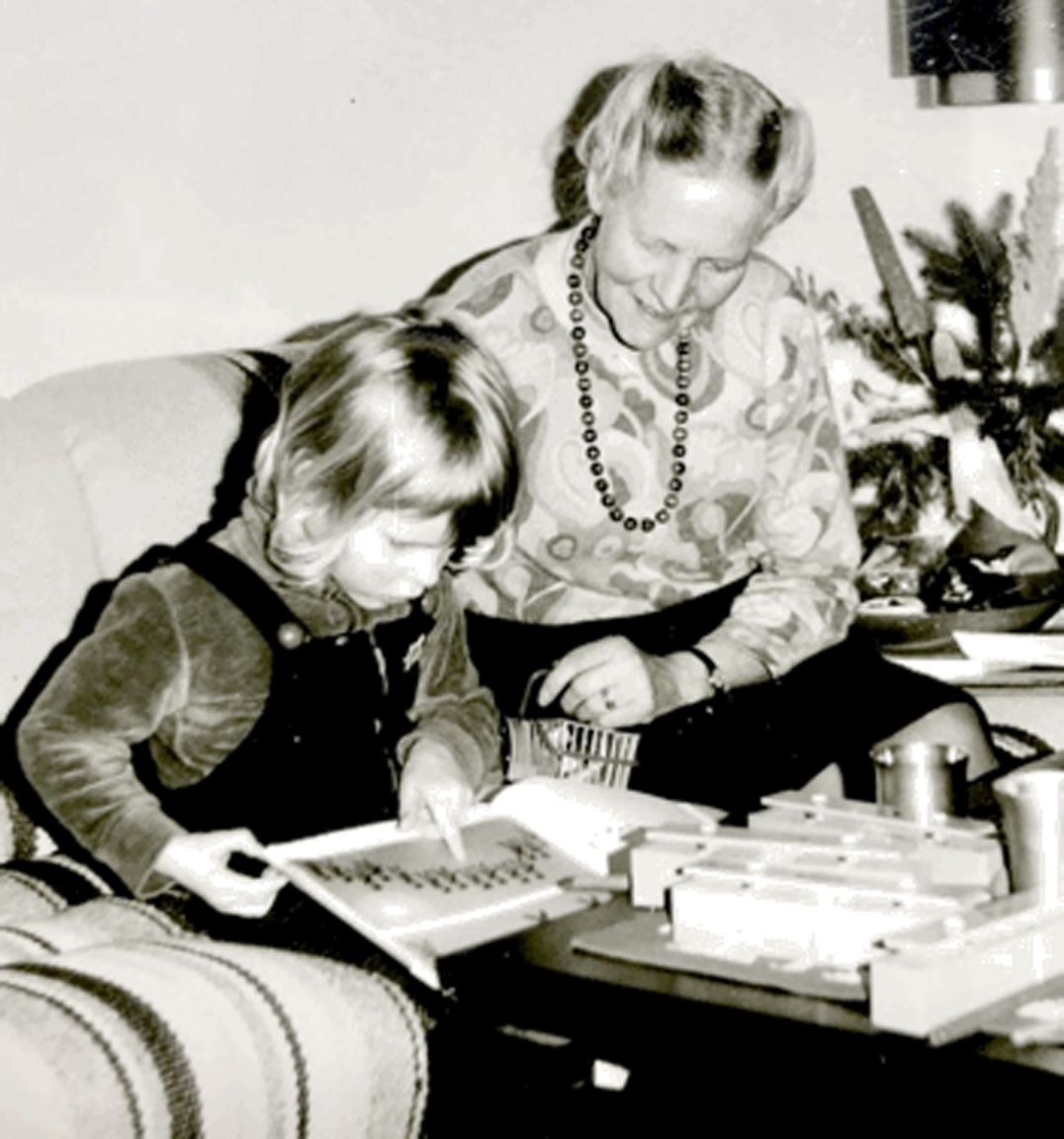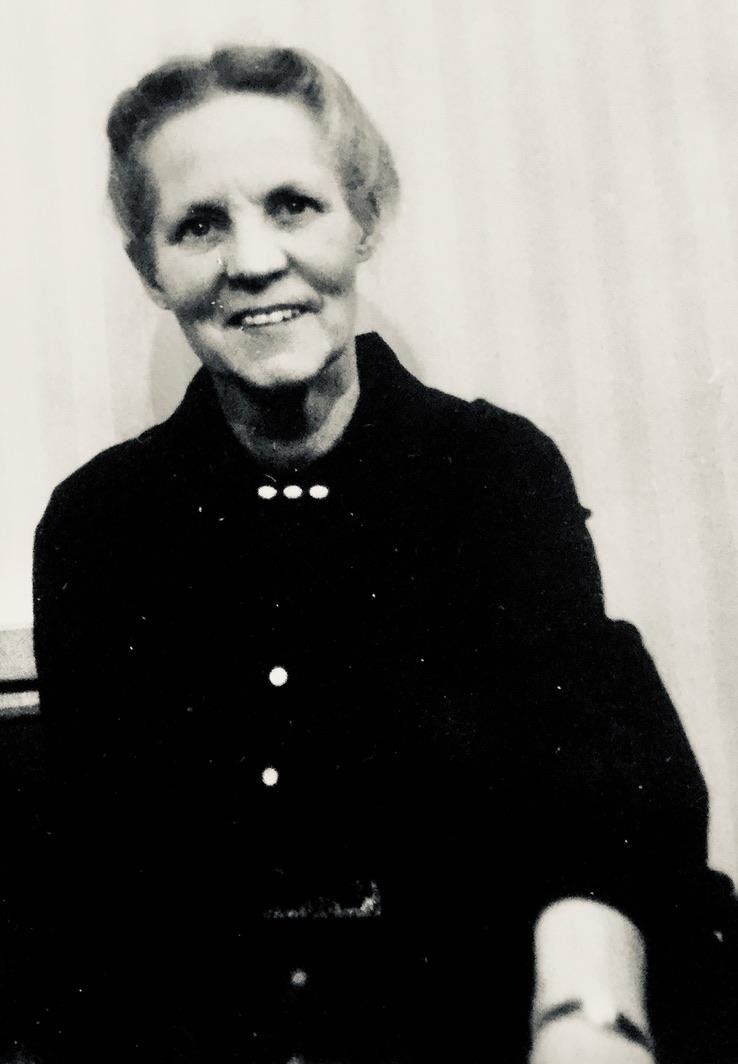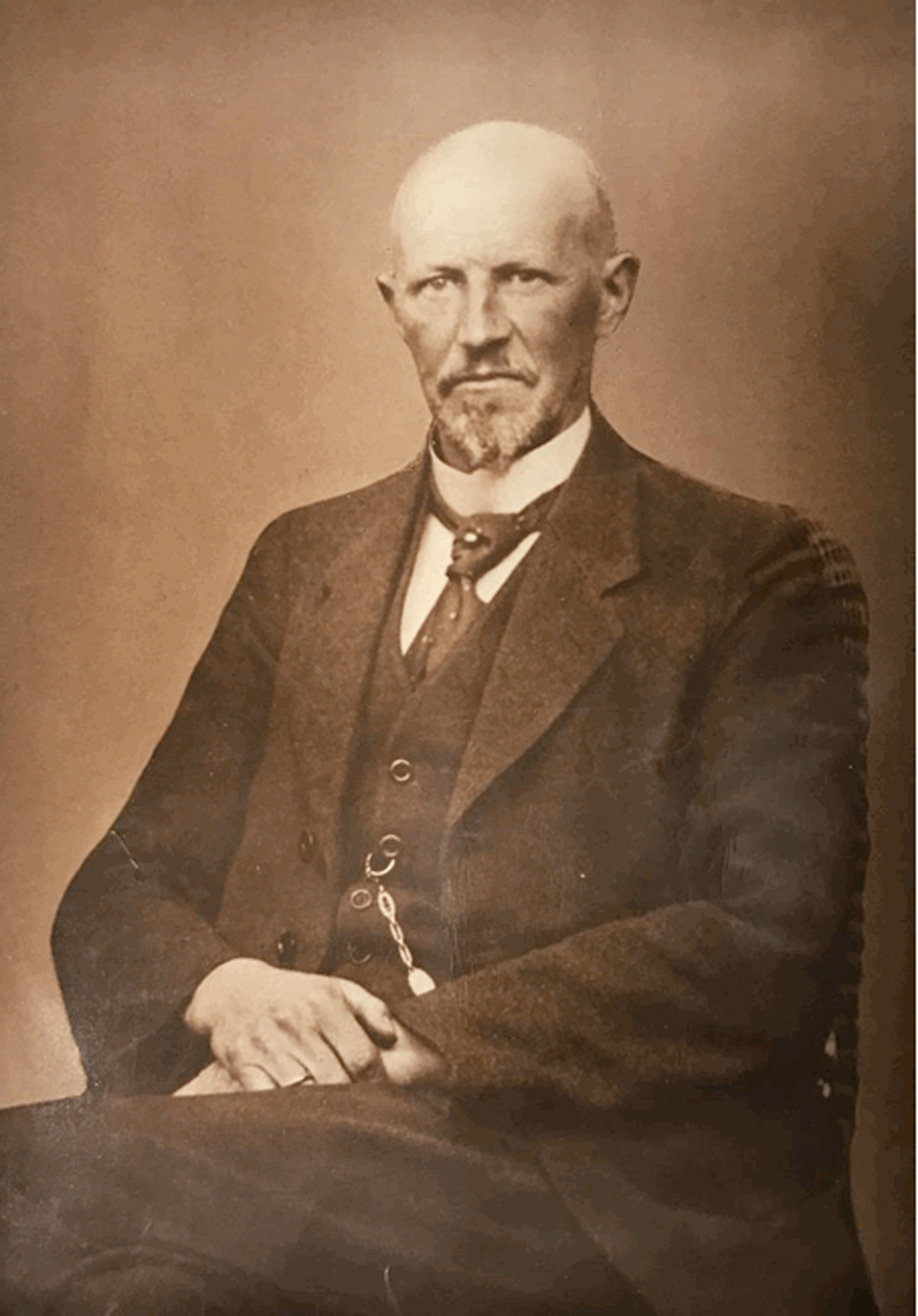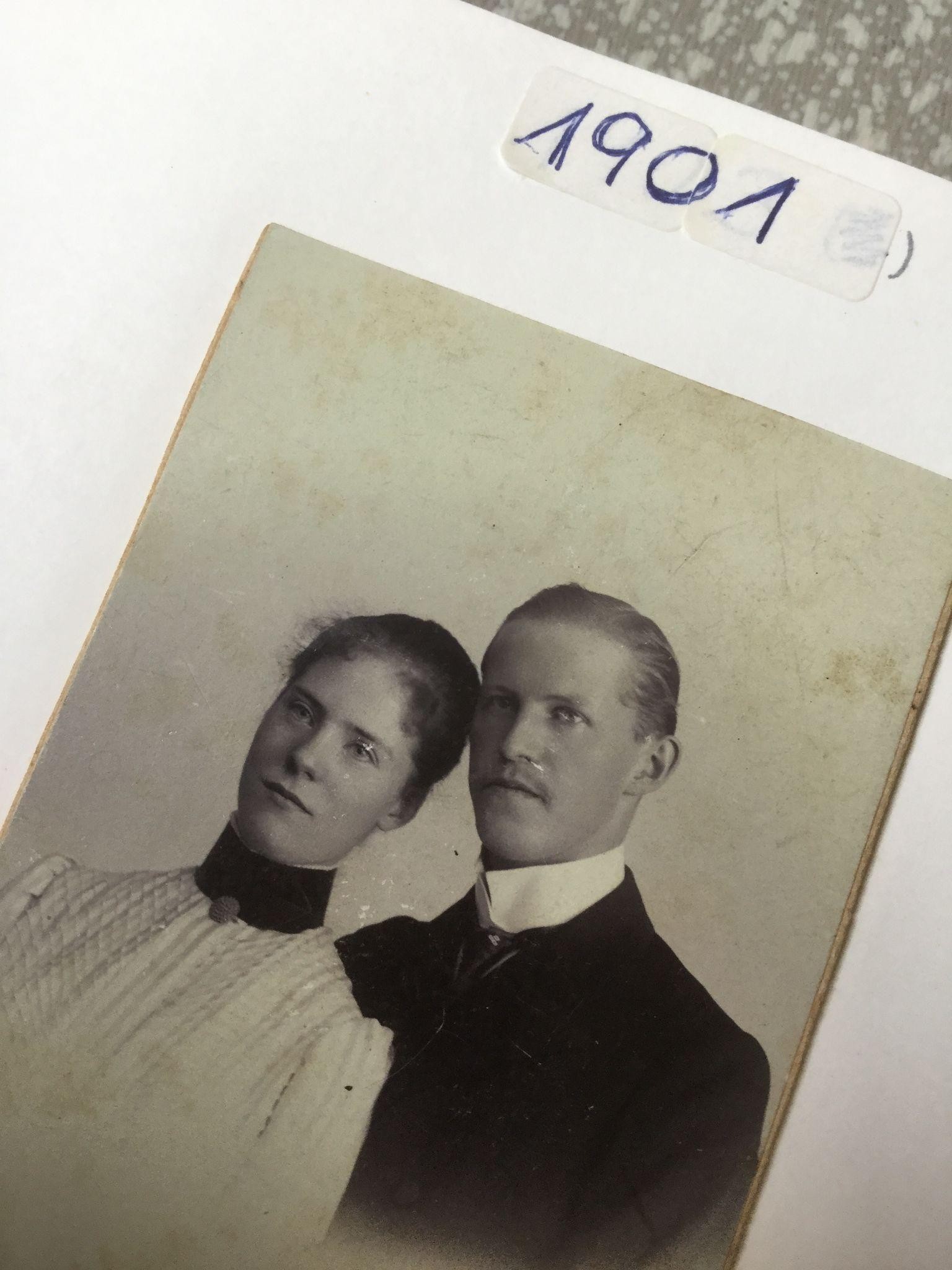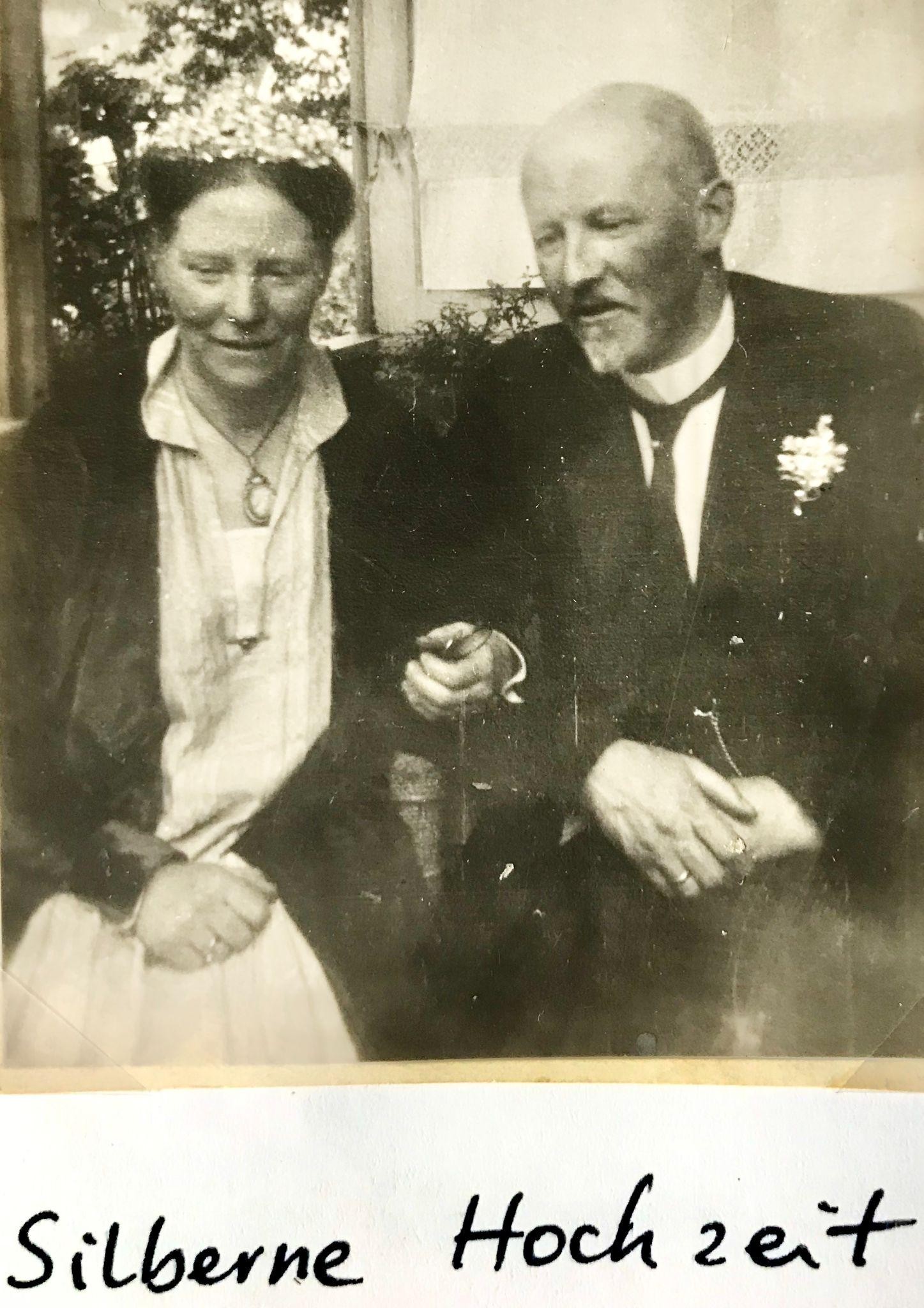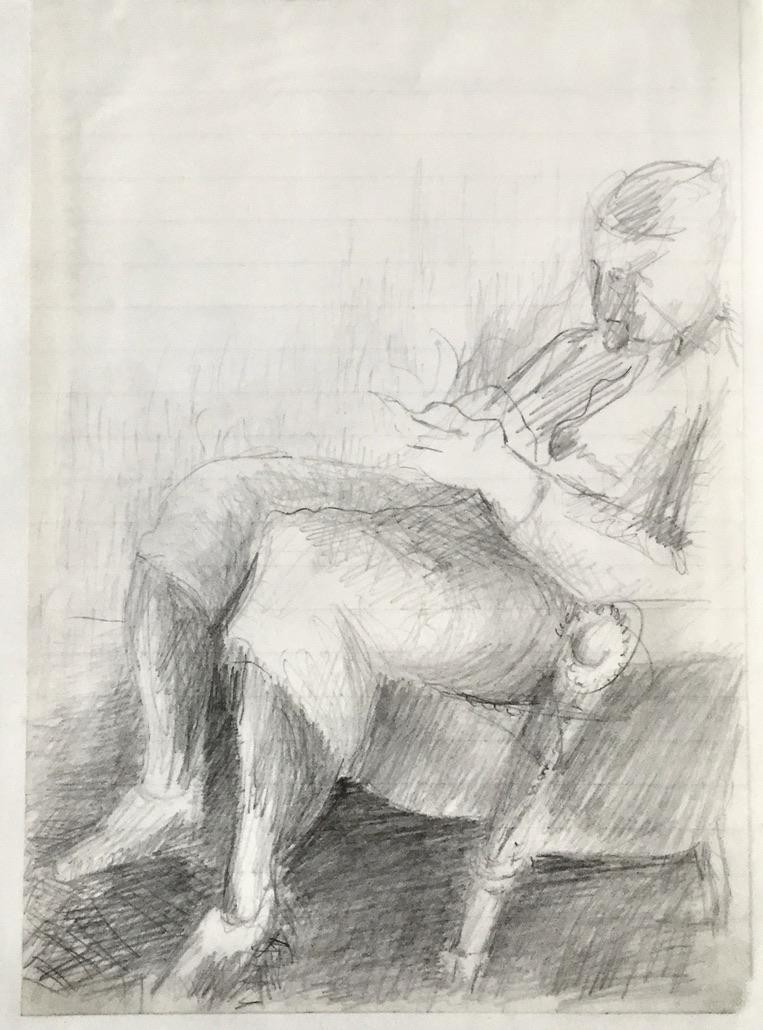MY MOTHER
and aunt Gathi
Agathe von Heydebrandt,
TANT GATHI
Silently our warm and humorous aunt became my “mother” because my mother had to spend long periods away from us in sanatoriums to cure her TB when I was 4 to 10 years old. When she was around she rested in a veranda, a kind of glasshouse attached to the dining room, inside this
beautiful country house that took us in as refugees
Talking about a Glasshouse, an event that stayed in everybody’s memory needs to be told here. I was getting dressed by my aunt standing on the table in front of
a comfortably sized window when a massive explosion covering me in glass head to toe that had to be very carefully removed and I to be reminded to stay still. The fiddling creature I was had to stay motionless like a statue. The massive bridge over the river Weser very near to us leading into the town had deliberately been blown up by Germans to stop the Americans coming in. This happened just before the end of the war and before American soldiers threw Kommissbrot and sweets to us children out from the back of their jeeps. I walked over “the Notbrücke” = temporary bridge to my primary school for 4 years.
I bonded with another aunt who was paralyzed. She lived near the primary school I had to walk to every morning and to return at midday, a long way over the temporary bridge, all on my own.
This aunt I ran to, after school, squeezing my body through the hedge of the playground in order to meet her, she lived on the other side of the road. That way I avoided being followed by a group of boys who often waited in hiding. They put my face into puddles or scared me otherwise. This aunt wasn’t a member of our family, that didn’t matter. She was kind and played board games with me.
When my aunt dressed us up and made costumes of different birds for a performance alongside verses for a summer show in the garden, she was at her best and got me excited. I was influenced by a circus number I had seen at the time in the circus Barum next to where we lived. On one of these garden events I proudly jumped from the swing structure onto a mattress, calling it ‘The Death Jump’.
My ‘mother’, aunt Gathi, became 102!!
Here she is at 92, leaving her place to see Renate.
My aunt’s belief was based on the bible. I hardly took this in, it was part of a daily ingredient served with an open mind, tolerance and humour. I certainly picked up on these influences later in my life…So for example when I jerk when people start eating before food is laid out at the table in front of them and the meal is ‘served’. We did a short prayer and held hands before we started eating and thanked
for what we had after a meal. On Sundays we sang canons before or after a meal.
When people take everything for granted I suppress my anger. I am aware that my aunts habits had an effect on me, they are still there and somehow I value them.
Two or three stories and events are unforgettable to me. So when my aunt said “da lachen ja die Hühner” (that makes the chickens laugh) or when she offered us food we didn’t want to eat, and called it “Maulmarschier Speise” (a march into your mouth meal) and when she went to shops with me to ask the keeper for anything to give us, including toys, that we then layed out on an open market for sale to help people in need. She herself earned money for us painting little oil patterns with dots onto glasses based on a Silesian traditional pattern.
I remember that she praised the crusts of bread to us. They became a price to the best helper.
She also could dress up in beautiful traditional eastern european clothes with hoods.
And RENATE von Heydebrand celebrates here
in her writing – she was 8 years older than me.
‘mother’:
“You were an eighth child. Your father died at 49 when you were 6. You experienced two world wars. You said “Terror leads to healing. Forget yourself and your own security, be carefree, even cheerful”. That mindset freed your head and hands and changed deficiency into capacity.
In 1925 you lost your “Mongolite” (down-syndrome) brother and your mother !!
The first WWar had given you no chance to marry but opened the way to help many children.
You worked in Youth Welfare, in a parish congregation in Berlin and then with a federation in East Prussia to help children who were uncared-for and neglected in big cities. 1928-1932 you were given the chance to lead a children’s home with a friend near the East Baltic sea and it turned out to be a very happy time for you. You had to find food and clothes from practically nowhere but the children themselves helped and years later thanked you for this enjoyable time.
“In 1939, Clara(my mother) was in a situation where she urgently needed help because she suffered from TB and had to be treated in a sanatorium. You helped out with her three children (us) and three other bedwetters from relatives from Cologne who had escaped the bombing in 1942. Then you added a full orphan into your “family”. In February 1945 all of you could not be regarded to live in a safe place, where you were, any longer. You decided to flee from the Russian army, which was 30 kilometres away. With 7 family members, including one helper, your adopted boy and me, the orphan girl, you dressed and fitted us out for emergencies and with food and pressed us into the last train leaving our station at night. We went through Dresden before it was bombed, lived in bunkers but found refuge in the house of a glass manufacturer, a contact connected to Bremen families. There you brought us up, 3 boys and me, the adopted “daughter”, from 1945 until 1950.”
Our escape created by aunt Gathi as a memory board game
Renate was our 8 years older “sister” who my “mother”/aunt had adopted when she had lost both her parents in a town near Königsberg in East Prussia, now Kaliningrad. Was SHE a member of our family ? For me our “sister” (Ziehschwester) was no outsider. I looked up to her. She was very intelligent but also good at art. She talked a lot about one art teacher whom she loved. Perhaps that influenced my decision to become an art teacher myself, much later in life ?
I remember when I was 10 reading a letter telling me that I failed the entrance exam to the Gymnasium. I sat on our steps to the balcony and cried. It was a wake up call, away from childhood. I thought about my “sister” then because I had wished to enter the school she did so well in. She was just about to leave with splendid exam results.
Renate In 2003 on a visit to our Barn
MY MOTHER
Only now do I realise how lucky I was to feel that I had two mothers!
Was this possibly harmful to my real mother? When I think about it, I don’t really know, because my mother and aunt Gathi became very good friends themselves.
My respect is certainly on my mother’s side.
The creative bursts and the sense of humour in my early childhood years, until I was 10, I received from the way my aunt was with me.
From 1930 to 1933 my mother taught children in a Portuguese family.
In a book about other German “Fräulein” on the Azores I read that she was more old-fashioned but therefore respected by the children. One of her children said in an interview 50 years later that she had lessons in Geography, Writing, Reading, Listening, Singing, Playing, Sports, Walks and did so well that she still can speak German, even now at around 1970, 50 years later.
In a letter to me in 1983 my very reasonable mother told me that she got her strength from her belief in God. She had collected all letters I wrote to her. And I kept hers to me. I reconstructed forgotten parts of my life. We had honest exchanges. I thank her for that. She really gave me what I needed, I mean responses, unlike people who didn’t say anything about my work or films.
She was trained in child care. (Sie war eine Kindergärtnerin). I questioned her and wrote back with a sense of humour: “What to do with trees that grow NOT straight?” I was flipped. But what she said about Hitler in 1939, that I instantly respected:
‘Hitler’s drive to be above God. That is hybris!’
She as a German Educator on the Azores,1930-1933, wearing woollen socks in the hot climate!
My mother defended my brother’s fatherly care for his workers against bullish Unions destroying his business through strikes and long paid holidays. I understood, because his finances were near to collapse throughout his life. Contrasting that, I felt in 1986 unions in Germany had after years of confrontation successfully brought employers to the table to discuss “best deals” for all sides. I felt that my brother had forced himself too much to solve an irresolvable situation. I never openly talked to him about that, I thought I couldn’t.
Who would be so tactless to confront him and my own mother ? And did I have no regard for my “family”? Was that so? I might have been outspoken to her, but I loved her, I loved her for my exchanges and that I could open up to her. She became a treasure to me and in that way “beautiful”.
When Tony Ben said, “I believe in the fact of Jesus but not in his divinity” I was with him.
My studies in theology, and of one professor of radical theology in particular, got me to ask questions about Jesus, and who he really was. Consider that I learned that nothing about him was written before 40 years after his death. Lectures guided us students to find the earliest words, sentences and thoughts he could have uttered in The New Testament written in Greek, a caesarean piece of work.
I never experienced an intelligent person denying the existence of Jesus. I myself see him as an outstanding living person with his own struggle. I encouraged students teaching in the German School London to read the stories and parables critically. In the way I have taught and made them aware of interpretations. Hundreds of images and films tried to visualise “the truth”.
But what comes nearer to it? What is further away from it?
Words are images in themselves but also able to open images in us.
How do we deal with the belief in God?
How do we deal with any established church or a sect?
What do we do when we can’t relate to beliefs and believers?
Do we avoid conversations or confrontations?
How do we stand our ground?
I read diaries from my mother after the war. From 1946 to 1948 she was almost constantly sent to hospitals or Sanatoriums to cure her TB. Hope to prevent the worst went in 1947. Her mother was called in to help. The change of rooms, from two to a one bedroom, indicated the seriousness of the situation. My mother called for the last supper. After Christmas she had a haemorrhage and was helped with ice bags. Our father was called in by phone. But…
she recalled feeling liturgic and that she took it for granted to be as it should be.
But a medical specialist tried at last minute a new procedure on her. He replaced one lung with pneumonia. After 6 torturous weeks my mother slowly recovered. It was a miracle, so everybody said.
I knew about the struggles behind the scenes.
Every photo, every film is beautifying simply because of the techniques in use. I can not go behind that. The reality often is everything else than wishful. And things change all the time and so do my perspectives on what was really going on. And, so it still is. I might see what happened but I can not catch it or run away from it.
All I can say about my mother is: There was enough reason for her to feel proud. With a helper she managed the essentials. Mostly lying down. She managed us astonishingly well. She trusted us.
We experienced being trusted. I learned to be trusting and to be patient from her.
It was and still is unbelievable that after all that she decided to create her dream
of ‘a family’ in 1951, when we left the place and town that had provided us with the care we needed to overcome our escape.
In our incredibly modest new flat for refugees a photo was taken to show the success of her dream: The picture of her 3 boys in musical interaction.
Born in 1908, here she is in 1976
teaching my 5 year old daughter.
They had a very good relationship and my daughter in 1992 made a Großmutter Album for my second daughter, born in 1996
My mother showed us this large photo of her father, our GRANDFATHER
This photo is the only thing I REMEMBER of him and of his past. I knew it well. It was valued like an icon for us children and taken as what it was, simply, that my mother loved him deeply. Was it because he died of TB when he was only 56 ?
When I look deeper there are stories of illness, business success and collapse and even bad behaviour in his life. Thousands of family pictures perform no more then a positive appraisal but I search for pictures nearer to the truth. Through my mother’s writing I found out that my grandfather lost his mother when he was 13 and that she died of TB …as well. She was the second wife of a successful businessman whose first wife had died of “Schwindssucht” = consumption or tuberculosis as it was called at the time… Both are referred to as very beautiful and kind women.
Both their husband himself was the 13th child of a well respected family, trading in garments in Bielefeld and Hamburg, in ‘Bielefelder Leinen’. Going back in history,
his mother was the oldest of 12 siblings. They lived in respectful positions in the Hanseatic town of Bremen. This explains my mothers attraction to holidays in Bremen and the attraction to an uncle who had really helped her in difficult times but died in the 1st WW.
My mother, as I said before, was 40 when she nearly died of TB herself …but survived and lived with one lung until 1981 !
In 1968 I responded to an offer to finish my studies in Bremen. For 4 years I lived there. My daughter was born there in 1971 ! She was brought up by her mother there until she was 20. There are very important connections to this town for me originating from my mother’s love to relatives in Bremen.
In 1908 my grandfather helped his cousins in a broker’s business and functioned as bookkeeper at first but advanced to be the general manager by 1913. The war in 1914 stopped this trade and took away men to run the business. He himself had to serve on the homefront but was not suitable for that hard work. In the cold winter of 1916/17, the so-called turnips winter, he worked as a locomotive stoker in Hamburg’s shunting traffic 15 hrs a day. After falling from a tram he had to stop working but was sent to a post office sorting place. I have no images of any of his workings but my mother wrote about his family life:
“At home he was often exhausted but always had time for us and was extremely thorough in whatever he touched. He was caring and expected the same from my older brother and me. We were reminded not to say anything unfavourable about people who are OUTSIDE the room. Inside we could joke with everybody present and he was humorous.
But he beat me 3 times as far as I remember and that had a lasting effect. It was sudden, hard and insulting and I had to say sorry afterwards. THAT I could hardly manage. It took me years to get over it.
Sunday church service and walks were tradition, so was the playing and the reading in the afternoons. His reading aloud was widely appreciated and attracted visitors, so did the music playing. Over the years we got to know many books because our father was such a good orator. He was a real house man although we only lived on one floor and we had to take pensioners in.”
Thoughts
The amount of children mothers bore in the 1800s makes me think.
It doesn’t seem to only be class related. It reminds me of Dickens and the graphics of Gustave Dore. And, what was the effect on the population on the whole ?
I wonder why in the 18th and 19th century some people had so many children ?
I wonder why TB was such a dominant illness and how it compares to diseases we have to overcome now ?
I wonder about the strictness of education and the acceptance of beating ?
And…
I often think about the fact that Hitler in his youth was severely and constantly beaten up over many years.
I found some pictures of my grandmother with him, in 1901.
and a photo from her silver wedding with my grandfather in 1928 when he already knew he would die but never openly talked about it.
My Grandmother, here she is. Images of my grandmother – we called her Grossmama – are well stored in my mind, firstly the photographs throughout her life and later in a film I did, but also in some of my drawings like this one here.
My grandmother had a fatal fall from a HighTrain platform in Hamburg near where she lived in the 1950s. She was pushed from somebody rushing along and onto the track. She was saved but suffered from that head percussion all her life from then on.
From 1970 on my mother took her up and lived with her and my father in a flat in Diez near Frankfurt. It was an uneasy relationship between the 3, but my ‘Grossmama’ became 96 knitting and reading at the same time all the time.

